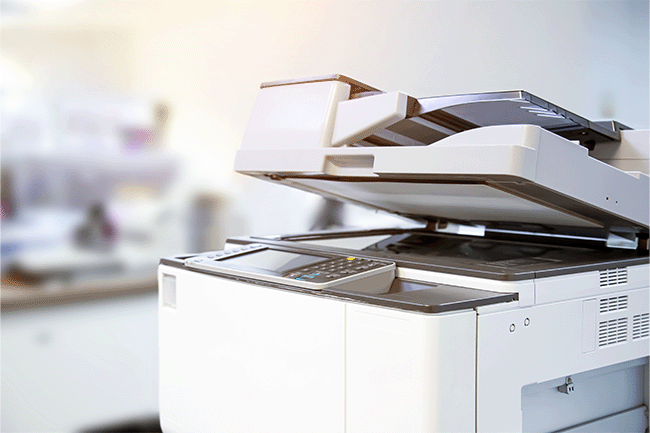
You've heard about managed print services before, but there doesn't seem to be a clear answer as to how they actually work. How do they save organizations money? What are the advantages of leveraging a company who does managed print services, and are there differences?
This article answers these questions and more. Our hope is to provide you with an unbiased and informative answer so that you can determine if leveraging a managed print services provider is right for your organization.
Not a lot of time? Skip to what you need:
How Do Managed Print Services Work?
How Do Managed Print Services Save Organizations Money?
What Are the Benefits of Managed Print Services?
How Do Managed Print Services Work?
Let's start with the basics. How does this service work?
Before we discuss what managed print services (MPS) is and how it works, let's discuss what it isn't.
In your market, you may have anywhere between 6-15 different copier dealers and vendors, depending on the size of the business population. There are also a number of printer and copier manufacturers in existence.
Xerox, Canon, Sharp, Konica Minolta, HP, and Ricoh are the largest for copiers. HP, Canon, Brother, Epson, and Kyocera are the largest printer manufacturers (at the writing of this article).
That means, if you're near a moderately sized or smaller city, you may have a handful of printer manufacturer dealers, but not likely to have more than two who carry the same brands - and more likely that some brands will only be carried by one.
What Managed Print Services Are Not
If you purchased from a manufacturer, you aren't likely to receive true managed print services unless your existing printer fleet all matches that manufacturer's products (example: you have all HP printers and copiers). A manufacturer prefers to sell you equipment, anyway, not service, because of how they make money and report to their shareholders.
RELATED: The Differences Between Copier Dealers and Manufacturers
The opposite is true of copier and printer dealers. So, at least we are moving in the right direction.
A printer dealer operates on a lower margin for equipment sales to compete with manufacturers and earn your business. Their goal is to get the service contract, which makes them better suited to provide higher quality managed print services.
Where they diverge from true MPS is in the "rip and replace" business model.
If you read the article mentioned above about copier dealers vs manufacturers, you know that they are well-equipped to service devices that they carry. Just as high quality as the manufacturer, and in many cases, better.
But if you are like many other organizations and have a blended printer set-up (ex: HP printers and Canon copiers), then it's unlikely a copier dealer carrying HP is going to want to only service your desktop printers. They will likely recommend you upgrade your equipment with newer HP copiers, as well.
Rip and replace.
This doesn't fit every organization's budget or needs, and this is not what managed print services is.
What Managed Print Services Are and How It Works
Managed prints services offer organizations flexibility by allowing them to keep their existing print fleet, no matter what the brand is (within reason). This typically requires a very large operation to have an appropriate number of service technicians who are specialized in nearly every brand.
Companies like Flex Print offer the ability for large organizations with locations across the United States to accomplish this. Their size and training of nearly every manufacturer's products make them a true MPS option.
Why MPS is so effective is in the beauty of how it works.
Because most printers are integrated into a network these days, your MPS provider is able to constantly monitor their usage, keep supplies delivered in an automated and "lean" manner, and report regularly on ways to consolidate or improve efficiencies.
All of this is achieved through software and automation, but is not a capability that all copier dealers have, and saving money is not always the goal of a copier dealer. An MPS provider's entire job revolves around creating efficiencies for your organization.
How Does MPS Save Money?

The result of these increased efficiencies is dollars in your pocket.
Ok, that's a vague statement. Specifically, how does this create more savings?
Printing is normally overseen by an office manager or an IT manager of some type. Sometimes its a purchasing manager or other title. We have never seen a Printer Fleet Manager as a job title at a company.
Simply put, making printer decisions is only part of someone's role at their place of employment; and it isn't that the decisions aren't important to them, but that they are just a portion of their job.
As a result, there is often a great deal of waste created. Toner supplies tend to be stockpiled, desktop printers tend to be more plentiful than needed, and shortcuts are sometimes used to fix a problem in a pinch (like purchasing a new printer instead of waiting for service or sending it back to the manufacturer).
You can quickly see how MPS can save larger organizations a great deal of money by avoiding some of these money pits.
What Are the Benefits of MPS?
Beyond the hard cost savings of managed print services, you gain increased efficiencies within your organization. Some MPS providers have software that can predict when your devices needs service so that you stay up and running even more than before.
RELATED: What is Automatic Toner Replenishment?
Additionally, because your machines are up and running more consistently, toner orders and shipments are being automatically placed, and a host of other automations, the person responsible for managing these tasks is freed to focus on other aspects of their job.
If you would like to learn more about how MPS can benefit your organization, reach out to Standard Office Systems today and discover how managed print services can modernize your printing.
Posted by Bryan Ammons

Bryan Ammons is the President and Owner of Standard Office Systems of Atlanta where he began his career as a part-time employee in 1973. SOS is a leading provider of office technology including managed IT services, copiers, printers, and business phone systems. Bryan has served on the board of the Copier Dealers Association for 11 years, including two as President. Additional, he served on the Dealer Advisory Councils of HP, Ricoh, Sharp, US Bank, and Great America Leasing.

